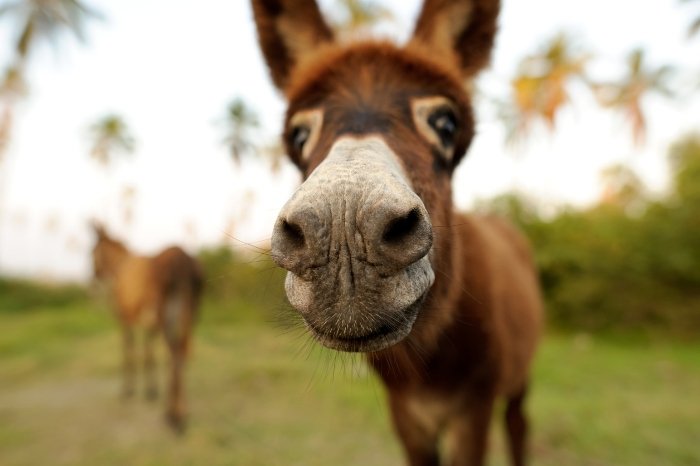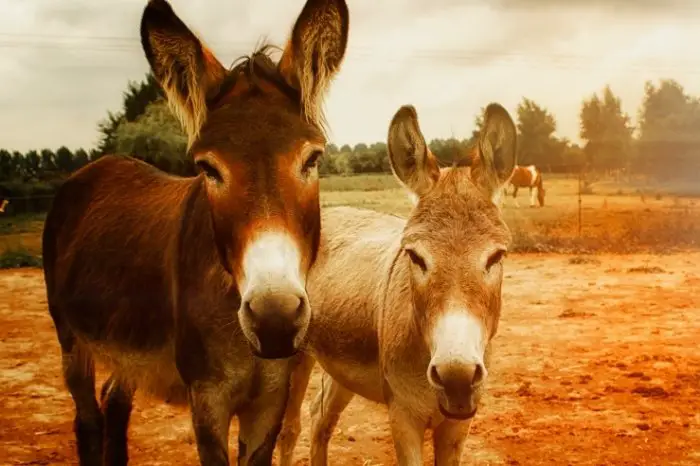Last Updated on October 11, 2022
Who doesn’t love a donkey, with its enormous fluffy ears! But is a donkey an equine, and are donkeys and horses related? Let’s find out!
What Is A Donkey? Is A Donkey An Equine?
Donkeys, also known as asses or burros, are four-legged mammals commonly found in many countries around the world. Historically they have been used for many centuries as a working animals, to haul and carry heavy loads. In the modern world, households in some underdeveloped countries still rely on their donkey to fulfill a number of essential roles.
The appearance of a donkey is unmistakable, as they are famed for their oversized and highly mobile ears. They have a relatively large head, a stocky body and thin legs. They have short, spiky manes and a thin tail.

Check Out How Long Does A Donkey Live For? Amazing Donkey Lifespan Facts Revealed!
Are Donkeys And Horses Related?
To understand whether donkeys and horses are related, we first need to understand how groups of animals are classified. Animals that are similar genetically are grouped into taxonomic families – this means they have shared characteristics and are normally descended from a common ancestor.
The taxonomic family of the donkey is Equidae, which is more commonly known as the horse family. Within this taxonomic group are horses, donkeys, and zebras. There were once other members of this taxonomic family but they are now extinct.
A taxonomic family is also broken down into subsections called genus, with animals that have close genetic links grouped together. Horses, donkeys, and zebras all belong to the same genus, called Equus. Members of this genus are collectively referred to as equines.
So this means that, technically, horses and donkeys are related. However, Equidae has been in existence for around 54 million years, so many genetic changes have occurred as a result of evolution during that time!
Read more about How Cold is ‘Too Cold’ For Horses To Be Outside?
Is A Donkey An Equine?
The term equine is used to refer to an animal that belongs to the genus Equus. This includes horses, zebras, and donkeys, as well as some other similar animals that are now extinct. This means that a donkey is an equine, as it is in the same genus as horses and zebras.

Here are the animals that make up the genus Equus:
- Equus – this group also includes all domesticated horses as well as the only true wild species of horse still in existence, Przewalski’s horse.
- Asinus – the donkey group, which is split into three types of donkeys. The domesticated donkey is descended from the African wild ass.
- Hippotigris – this group contains three subdivisions of zebra species.
Are Donkeys Sterile?
Donkeys are not sterile, and they are able to reproduce with other donkeys. If donkeys were sterile then they would not be so widespread around the world!
The reason that some people assume that donkeys are sterile comes about as a result of some confusion around the offspring of donkeys and horses. Donkeys and horses can mate and reproduce successfully, as they are very similar genetically. The offspring of a female horse and male donkey is called a mule, and the opposite is called a hinny.
However, the offspring of a donkey and horse are almost always sterile and are unable to reproduce. The reason for this is because donkeys and horses are close enough genetically to reproduce, but their offspring will have a mismatched set of chromosomes. Evenly matched chromosomes are essential for effective cell reproduction to take place.
Horses have 64 chromosomes, while donkeys only have 62. When a donkey and a horse are bred together, the offspring will have 63 chromosomes – 31 mismatched pairs, and one horse chromosome that is not matched with another chromosome.
Donkeys: Miniature, Standard, and Mammoth: A Veterinary Guide for Owners and Breeders
What Is The Scientific Name For A Donkey?
The domesticated donkey is a subspecies, as it is very closely related to its wild counterpart. The scientific name for the species of the donkey is Equus asinus, and its subspecies is called Equus Africanus asinus. This is more commonly known as the African wild ass, and all domesticated donkeys are descended from this species of ass.
There are two other species of ass, both of which are still in existence in the wild. In some areas, the name ass is used to refer to the wild version of this species, and the domesticated ass has been renamed donkey.
Click Here to Get Info About Incubation Period Of Strangles In Horses – And Symptoms
Difference Between Donkey And Horse Explained
There are some very obvious differences between donkeys and horses that you will spot straight away. The main difference in appearance is the size of the ears – donkey ears are long, mobile, and sometimes very fluffy! Horses also have a long, flowing mane and tail, whereas donkeys tend to just have short spikes of wiry hair.
The body shapes of these two equines are also very different. Donkeys have a stocky body with slim yet nimble legs, while horses have smaller bodies and heads and longer legs in proportion to their overall size.
There are also some key differences in terms of the characteristics and personalities of these two equines. Donkeys tend to be calm and placid, but they also have a reputation for being very stubborn. Donkeys also form deep and long-lived bonds with each other and will go through a period of mourning when their best friend passes away.
Horses tend to be more lively and energetic than donkeys, and tend to be more versatile when it comes to participating in equestrian sports. However, donkeys have been successfully trained to carry out a wide range of activities, so don’t rule them out!
Summary – Is A Donkey An Equine?
So, as we have learned, a donkey is an equine, and it belongs to the same mammal family as horses and zebras. However, donkeys have some key genetic differences from horses, and although donkeys and horses can breed together they will produce hybrid offspring which are infertile and unable to reproduce. Donkeys are still commonly used as working animals in many countries around the world, although elsewhere they are now only kept as pets.
We’d love to hear your thoughts on is a donkey an equine! Are you a big fan of donkeys and you’d love to own a pair of donkeys as part of your equine family? Or maybe you’ve got some questions about the best way to care for a donkey? Leave a comment below and we’ll get back to you!

Kate Chalmers is a qualified veterinary nurse who has specialized in horse care for the vast majority of her career. She has been around horses since she was a child, starting out riding ponies and helping out at the local stables before going on to college to study Horse Care & Management. She has backed and trained many horses during her lifetime and competed in various equestrian sports at different levels.
After Kate qualified as a veterinary nurse, she provided nursing care to the patients of a large equine veterinary hospital for many years. She then went on to teach horse care and veterinary nursing at one of the top colleges in the country. This has led to an in-depth knowledge of the care needs of horses and their various medical ailments, as well as a life-long passion for educating horse owners on how to provide the best possible care for their four-legged friends.
Kate Chalmers BSc (Hons) CVN, Dip AVN (Equine) Dip HE CVN EVN VN A1 PGCE

